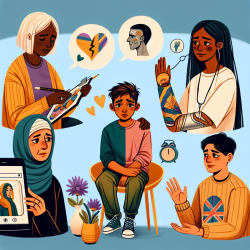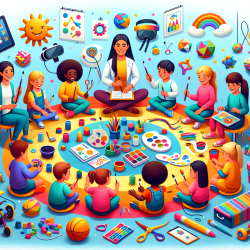As a practitioner providing online therapy services to schools, understanding the dynamics between adolescents and their parents is crucial. Recent research by Tschan et al. (2022) titled A comparison of expressed emotion between mothers and their adolescent daughters with and without a history of nonsuicidal self-injury sheds light on the critical role of expressed emotion in families with adolescents engaging in nonsuicidal self-injury (NSSI).
Expressed emotion (EE) refers to the level of criticism, hostility, and emotional involvement expressed by family members toward one another. The study found that adolescents with NSSI exhibited significantly more covert criticism and critical tone toward their mothers compared to their peers without NSSI. These findings highlight the importance of family-based interventions in treating NSSI to improve the quality of parent-adolescent relationships.
Here are some key takeaways from the study that can be applied in your practice:
- Family Dynamics: Adolescents with NSSI often experience higher levels of criticism and conflict in their interactions with their mothers. Addressing these dynamics through family-based interventions can help improve outcomes.
- Expressed Emotion: High levels of expressed emotion, particularly criticism, are linked to poorer clinical outcomes. Interventions should aim to reduce criticism and promote positive communication within the family.
- Emotion Regulation: Adolescents with NSSI may struggle with emotion regulation. Teaching both adolescents and their parents strategies to manage emotions can be beneficial.
- Parental Involvement: Involving parents in therapy sessions can provide a more comprehensive approach to treatment. Programs like Dialectical Behavior Therapy for Adolescents (DBT-A) and Emotion Regulation Individual Therapy for Adolescents (ERITA) include family components that have shown promise.
To further your understanding and improve your practice, consider the following actions:
- Incorporate family-based interventions in your therapy sessions to address the reciprocal nature of expressed emotion between parents and adolescents.
- Use tools like the Five-Minute Speech Sample (FMSS) to assess levels of expressed emotion and tailor interventions accordingly.
- Stay updated with the latest research to continuously refine your therapeutic approaches.
Understanding the complex dynamics of expressed emotion can significantly enhance the effectiveness of your interventions. By focusing on improving family interactions and reducing criticism, you can create better outcomes for adolescents struggling with NSSI.
To read the original research paper, please follow this link: A comparison of expressed emotion between mothers and their adolescent daughters with and without a history of nonsuicidal self-injury.










